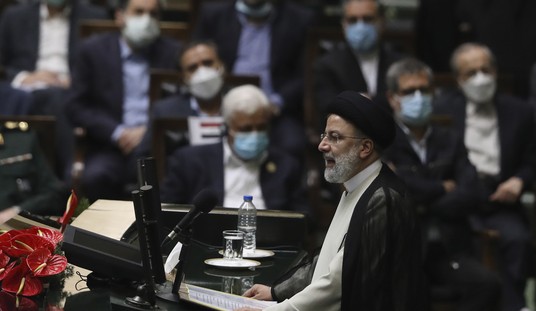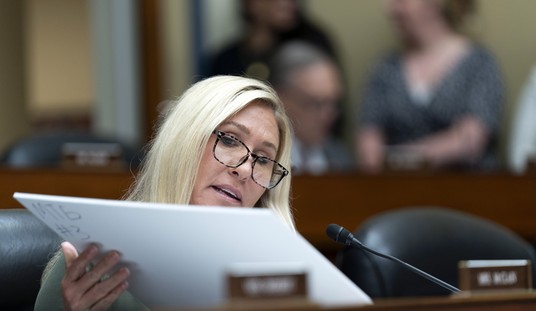Hey, who’s up for three conventions in this election year? First Marco Rubio called for a constitutional convention to pass a balanced budget amendment, figuring that Congress simply won’t act to tie their own hands. Now Texas Governor Greg Abbott wants an Article V convention and has a more ambitious agenda in mind:
Gov. Greg Abbott, aiming to spark a national conversation about states’ rights, said Friday that he wants Texas to lead the call for a convention to amend the U.S. Constitution and wrest power from a federal government “run amok.”
“If we are going to fight for, protect and hand on to the next generation, the freedom that [President] Reagan spoke of … then we have to take the lead to restore the rule of law in America,” Abbott said during a speech at the Texas Public Policy Foundation’s Policy Orientation that drew raucous applause from the conservative audience.
Along with the speech, Abbott released a nearly 70-page plan – part American civics lesson, part anti-Obama diatribe – detailing nine proposed constitutional amendments that he said would unravel the federal government’s decades-long power grab and restore authority over economic regulation and other matters to the states.
The Dallas News gives a list of Abbott’s proposed amendments:
- Prohibit congress from regulating activity that occurs wholly within one state.
- Require Congress to balance its budget.
- Prohibit administrative agencies from creating federal law.
- Prohibit administrative agencies from pre-empting state law.
- Allow a two-thirds majority of the states to override a U.S. Supreme Court decision.
- Require a seven-justice super-majority vote for U.S. Supreme Court decisions that invalidate a democratically enacted law
- Restore the balance of power between the federal and state governments by limiting the former to the powers expressly delegated to it in the Constitution.
- Give state officials the power to sue in federal court when federal officials overstep their bounds.
- Allow a two-thirds majority of the states to override a federal law or regulation.
On the merits of these amendments alone, I can only really fault the Supreme Court super-majority proposal. Oh, it sounds good, but what happens when a state legislature passes a law that bans firearm ownership, for example? Do we want to have to win not just Antony Kennedy but also Sonia Sotomayor and Elena Kagan as well? Good luck with that.
The proposal for a convention would open up the entirety of the Constitution for amending, especially if it serves as broad an agenda as Abbott proposes. USA Today objected to Rubio’s proposal for an Article V convention on the grounds that it could invoke chaos:
There is a good reason why no constitutional convention has been called since the original one in 1787, and why all 27 existing amendments have been approved through the standard method — a two-thirds vote in Congress and ratification by three-quarters of the states.
A convention would be impossible to control. Nothing in the Constitution gives Congress or the Supreme Court the power to tell the conventioneers what to do, or not do. A convention might be tasked to draft a balanced budget amendment and then decide that it wants to radically change the nature of the federal government or its relationship with the states. It might take up a passion of the moment by, say, limiting immigration by nationality or religious affiliation. It would have nearly unfettered powers to tinker with the DNA of America’s 240-year-old democracy. As Justice Antonin Scalia puts it: “Who knows what would come out of it?”
Once the convention drafts its amendments, another can of worms would be opened. Thirty-eight states would be needed for ratification. But the Constitution provides no time limit on this process. Indeed, the 27th Amendment — a fairly innocuous one affecting congressional pay — was proposed in 1789 and ratified in 1992.
Actually, these are odd objections, and somewhat self-canceling. The time-limit issue applies to all amendments, whether initiated by Congress or an Article V convention, so the only change is that there might be more than one in process. Perhaps an Article V convention could address that shortcoming. If the big worry is that conventioneers might go nuts and propose fantastical amendments, then the necessity of garnering ratifications from three-quarters of the states pretty much dispenses with that concern, no? This seems to be more a risk for the Left rather than the Right, anyway; as Abbott shrewdly observes, Republicans control more state legislatures, while the Left’s power is concentrated in a few big states whose population advantages will be irrelevant in such a process.
About the only proposals that might get 3/4 ratification would be those which deal specifically with the federal-state relationship. The balanced budget might actually be tougher, as some states rely on federal largesse to paper over their own problematic budgets. Just the first proposal, an effective repeal of the Wickard v Filburn decision, would be worth the effort, and again something that Congress would likely be loathe to take up. (Oddly not on Abbott’s list: a repeal of the 16th and 17th Amendments.)
The biggest potential worry is that nothing gets accomplished. The Left will want more gun control, but they probably couldn’t even get half of the states to go along with it. The Right will want marriage delegated back to the states, but narrowing the opposition to that to 12 states or fewer will be a mighty difficult task; the same will be true for abortion restrictions. Holding an Article V convention that endorses the status quo might be more disillusioning than the status quo itself already is.
Even with the small-ish risk of watching utter nonsense get debated and the magnet for loony activists to demand trigger warnings rather than the First Amendment, and the larger risk of futility, an Article V convention would be worth it to correct the balance of power between Washington and the states. Clearly, it’s the only way that those issues will ever be addressed. If the states really care about those issues, this is the only vehicle that can possibly deliver.
Update: I used “constitutional convention” in the original headline as a kind of generic term, but have received feedback from a few people reminding me that “Article V convention” is more specific and accurate. I’ve changed the headline accordingly.








Join the conversation as a VIP Member